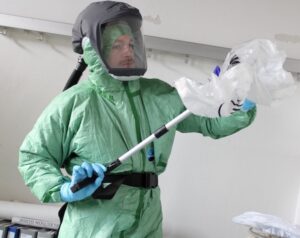
Story by Walter Ham
20th CBRNE Command
MUNICH, Germany – American Soldiers from a one-of-a-kind mobile laboratory command trained with German and Tunisian military medical professionals at the Bundeswehr Institute of Microbiology in Munich, Germany.
During a week-long training session, Soldiers from the 1st Area Medical Laboratory honed their skills to conduct safe and efficient biological warfare agent sampling procedures for collection, rapid testing and transportation to laboratories.
The Aberdeen Proving Ground, Maryland-headquartered 1st Area Medical Laboratory is part of the 44th Medical Brigade and 20th Chemical, Biological, Radiological, Nuclear, Explosives (CBRNE) Command, the U.S. military’s premier CBRNE formation.
From 16 bases and 19 states, Soldiers and Army civilians from 20th CBRNE Command take on the world’s most dangerous hazards in support of joint, interagency and allied operations.
Soldiers from 1st Area Medical Laboratory deploy as a unit or in task-organized teams to perform surveillance, laboratory testing and health hazard assessments of environmental, occupational, endemic disease and CBRNE threats to support force protection and Weapons of Mass Destruction missions.
Activated in 1942, the 1st Area Medical Laboratory has served in World War II, Korea, Vietnam and Afghanistan. Soldiers from the 1st AML deployed to help contain the Ebola outbreak in Liberia in 2014 – 2015. The 1st AML was also the first Army unit to deploy to U.S. military installations overseas during the COVID-19 pandemic.
The classroom training at the Bundeswehr Institute of Microbiology covered biological warfare agents, including toxins, bacterial strains and viral sources.
During the hands-on training phase, Soldiers tackled a variety of challenging scenarios designed to test their ability to plan and execute missions to collect suspected biological warfare agent samples for laboratory analysis.
German Armed Forces Lt. Col. Kilian Stoecker and U.S. Army Lt. Col. Katharina Müller led the training course at the Bundeswehr Institute of Microbiology.
Sgt. Adam T. Phayamouk from the 1st Area Medical Laboratory said the teams took on different challenges and focused on collecting forensic evidence for international court.
“There are diverse approaches to effectively gather sufficient forensic laboratory evidence to support a criminal case or to improve force health protection initiatives,” said Phayamouk. “Our primary goal in traveling to Germany was to acquire expertise in developing secure and efficient procedures for sampling biological warfare agents.”
Phayamouk said he was motivated to join the U.S. Army and serve as a Medical Laboratory Technician for the world-class training.
“I embraced the challenge of this distinctive opportunity. The Army’s Medical Laboratory Technician Military Occupational Specialty is known for its demanding curriculum,” said Phayamouk, a native of New Hampshire.
“Successfully completing this training places individuals among the Army’s best in healthcare,” said Phayamouk. “Medical Laboratory Technicians play diverse roles, including responsibilities related to patient healthcare and contributing to the enhancement of force health protection.”
Spc. Cormac B. Burns from the 1st Area Medical Laboratory said his team worked together with the Tunisian military to “put the pieces together” during a training scenario.
“We trained on how to investigate any suspected biological agent situation – from sourcing the material through after the dispersal,” said Burns. “The Tunisian team has a forensic investigation background, whereas we have experience in the laboratory side of things. Working together definitely led us both to being able to find the best possible samples for each of the different scenarios.”
Originally from Austin, Texas, Cormac has been in the U.S. Army for two years. He studied microbiology in college and has built on that knowledge at 1st AML.
“The 1st Area Medical Laboratory has let me see all of that knowledge applied in way that’s unique in the Army,” said Burns. “There’s no better spot in the Army for a lab tech.”